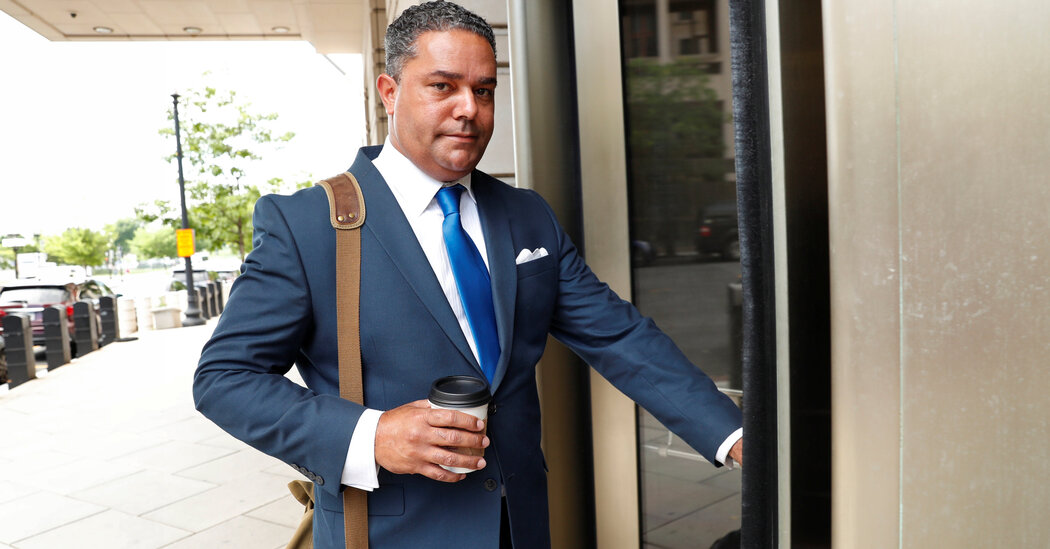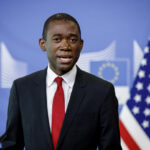
One week before an angry mob stormed the Capitol, a communications expert named Jason Sullivan, a onetime aide to Roger J. Stone Jr., joined a conference call with a group of President Donald J. Trump’s supporters and made an urgent plea.
After assuring his listeners that the 2020 election had been stolen, Mr. Sullivan told them that they had to go to Washington on Jan. 6, 2021 — the day that Congress was to meet to finalize the electoral count — and “descend on the Capitol,” according to a recording of the call obtained by The New York Times.
While Mr. Sullivan claimed that he was “not inciting violence or any kind of riots,” he urged those on the call to make their presence felt at the Capitol in a way that would intimidate members of Congress, telling the group that they had to ensure that lawmakers inside the building “understand that people are breathing down their necks.”
He also pledged that Mr. Trump was going to take action on his own; the president, he said, was going to impose a form of martial law on Jan. 6 and would not be leaving office.
“Biden will never be in that White House,” Mr. Sullivan declared. “That’s my promise to each and every one of you.”
The recording of the call, which took place on Dec. 30, 2020, emerged as the Justice Department has expanded its criminal investigation of the Capitol attack. It offers a glimpse of the planning that went on in the run-up to the storming of the Capitol and the mind-set of some of those who zeroed in on Jan. 6 as a kind of last stand for keeping Mr. Trump in office.
It also reflects the complexities that federal prosecutors are likely to face as they begin the task of figuring out how much — or even whether — people involved in the political rallies that preceded the assault can be held accountable for the violence that erupted.
After more than a year of focusing exclusively on rioters who took part in the storming of the Capitol, prosecutors have widened their gaze in recent weeks and have started to question whether those involved in encouraging protests — like the one that Mr. Sullivan was describing — can be held culpable for disrupting the work of Congress.
Mr. Sullivan’s remarks during the call appeared to be an effort to motivate a group of people aggrieved by the election to take direct action against members of Congress on Jan. 6, presaging what Mr. Trump himself would say in a speech that day. While it remains unclear whether anyone on Mr. Sullivan’s call went on to join the mob that breached the Capitol, he seemed to be exhorting his listeners to apply unusual pressure on lawmakers just as they were overseeing the final count of Electoral College votes.
In a statement provided by his lawyer, Mr. Sullivan played down the nature of the call, saying he had merely “shared some encouragement” with what he described as “people who all felt their votes had been disenfranchised in the 2020 elections.” Mr. Sullivan said he had been asked to participate in the call by a group of anti-vaccine activists — or what he called “health freedom advocate moms” — who were hosting “a small, permitted event” at the Capitol on Jan. 6.
“I only promoted peaceful solutions where Americans could raise their voices and be heard as expressed in our First Amendment,” Mr. Sullivan said in the statement. “I in no way condone the violence of any protesters.”
Still, in the recording of the call, Mr. Sullivan can be heard telling his listeners that the lawmakers inside the Capitol “need to feel pressure.”
“If we make the people inside that building sweat and they understand that they may not be able to walk in the streets any longer if they do the wrong thing, then maybe they’ll do the right thing,” he said. “We have to put that pressure there.”
As the Justice Department widens its inquiry, federal prosecutors are using a grand jury in Washington to gather information on political organizers, speakers and so-called V.I.P.s connected to a series of pro-Trump rallies after the 2020 election. One prominent planner of those rallies, Ali Alexander, received a subpoena from the grand jury and said last week that he intended to comply with its requests.
In the run-up to Jan. 6, Mr. Alexander publicly discussed a pressure campaign against lawmakers that was meant to stop the final electoral count, saying he was working with Representative Mo Brooks of Alabama and Representatives Andy Biggs and Paul Gosar of Arizona, all Republicans.
“We four schemed up of putting maximum pressure on Congress while they were voting,” Mr. Alexander said in a since-deleted video on Periscope. The plan, he said, was to “change the hearts and the minds of Republicans who were in that body, hearing our loud roar from outside.”
It is unclear if the Justice Department is aware of Mr. Sullivan’s conference call; the department declined to comment. The House committee investigating the events of Jan. 6 was provided with a copy of the recording some months ago by the woman who made it, Staci Burk, a law student and Republican activist from Arizona.
Shortly after the election, Ms. Burk became convinced that phony ballots had been flown in bulk into Phoenix Sky Harbor International Airport. She eventually submitted an anonymous affidavit concerning the ballots in an election fraud case filed in Federal District Court in Phoenix by the pro-Trump lawyer Sidney Powell.
Capitol Riot’s Aftermath: New Developments
Debating a criminal referral. The Jan. 6 House committee has grown divided over whether to make a criminal referral to the Justice Department of former President Donald J. Trump, even though it has concluded that it has enough evidence to do so. The debate centers on whether a referral would backfire by politically tainting the expanding federal investigation.
After becoming involved with Ms. Powell, Ms. Burk said she had been approached by several members of a right-wing paramilitary group, the 1st Amendment Praetorian, which was associated with a former legal client of Ms. Powell’s, Michael T. Flynn, Mr. Trump’s first national security adviser.
Ms. Burk said that members of the group then placed her under unwanted surveillance, insisting on moving into her home in what they described as an effort to protect her from people who might want to retaliate against her for coming forward about voter fraud.
It was a member of the 1st Amendment Praetorian, Ms. Burk said, who had joined the conference call that featured Mr. Sullivan. Ms. Burk said she recorded the call, much like she recorded other activities by the 1st Amendment Praetorian, because she felt threatened and unsafe by the group’s presence in her home.
At one point during the call, Mr. Sullivan was asked by an unknown questioner whether Mr. Trump intended to impose martial law on Jan. 6. That explosive notion had been raised publicly two weeks earlier by Mr. Flynn during an appearance on the right-wing television network Newsmax.
Mr. Sullivan answered the question by telling the man that he foresaw Mr. Trump putting in place “a limited form of martial law” on Jan. 6.
“I don’t see any other way around it, because he’s not going to allow an election fraud to take place,” Mr. Sullivan said. “It’s not going to happen.”
A social media consultant who calls himself “the Wizard of Twitter,” Mr. Sullivan worked for a political action committee run by Mr. Stone, a longtime confidant of Mr. Trump’s, during the 2016 presidential campaign. According to Reuters, one of the projects he did for Mr. Stone was a strategy document describing how to use Twitter “swarms” to amplify political messages.
More recently, Mr. Sullivan has taken an active role in promoting the QAnon conspiracy theory, which holds that prominent liberals belong to a cult of Satan-worshipping pedophiles. At a public appearance last year with Ms. Powell and Mr. Flynn, Mr. Sullivan called Hillary Clinton a “godawful woman” and then made a gesture suggesting she should be hanged.
On the conference call ahead of Jan. 6, Mr. Sullivan told his listeners that he was an expert at making things go viral online, but that it was not enough to simply spread the message that the election had been stolen.
“There has to be a multiple-front strategy, and that multiple-front strategy, I do think, is descend on the Capitol, without question,” he said. “Make those people feel it inside.”
Luke Broadwater contributed reporting.




